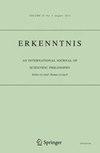How to Do Empirical Political Philosophy: A Case Study of Miller’s Argument for Needs-Based Justice
IF 0.8
2区 哲学
0 PHILOSOPHY
引用次数: 1
Abstract
Abstract In recent years an increasing number of political philosophers have begun to ground their arguments in empirical evidence. I investigate this novel approach by way of example. The object of my case study is David Miller’s renewed empirical argument for a needs-based principle of justice. First, I introduce Miller’s argument. Then I raise four worries about the application of his methodology that give rise to corresponding general recommendations for how to do empirical political philosophy. Proponents of this approach should take care to (1) check for inappropriately narrow (and broad) samples, (2) verify studies’ relevance for their empirical hypotheses, (3) adjust their confidence to the available empirical evidence, and (4) properly integrate their hypotheses into their philosophical theorizing.如何做经验主义政治哲学:以米勒的需求正义论为例
近年来,越来越多的政治哲学家开始将他们的论点建立在经验证据的基础上。我通过实例来研究这种新颖的方法。我的案例研究的对象是大卫·米勒(David Miller)对基于需求的正义原则的最新实证论证。首先,我介绍米勒的观点。然后,我对他的方法论的应用提出了四个担忧,这些担忧对如何进行经验政治哲学提出了相应的一般性建议。这种方法的支持者应该注意(1)检查不适当的狭窄(和广泛)样本,(2)验证研究与经验假设的相关性,(3)调整他们对现有经验证据的信心,以及(4)适当地将他们的假设整合到他们的哲学理论中。
本文章由计算机程序翻译,如有差异,请以英文原文为准。
求助全文
约1分钟内获得全文
求助全文
来源期刊

ERKENNTNIS
PHILOSOPHY-
CiteScore
2.10
自引率
11.10%
发文量
116
期刊介绍:
Erkenntnis is a philosophical journal publishing papers committed in one way or another to the philosophical attitude which is signified by the label ''scientific philosophy''. It concentrates on those philosophical fields which are particularly inspired by this attitude, although other topics are welcome as well. These fields are:- Epistemology - Philosophy of science, foundations and methodology of science in general and of natural and human sciences such as physics, biology, psychology, economics, social sciences in particular - Philosophy of mathematics - Logic, philosophy of logic, and all kinds of philosophical logics - Philosophy of language - Ontology, metaphysics, theory of modality - Philosophical psychology, philosophy of mind, neurophilosophy - Practical philosophy, i.e. ethics, philosophy of action, philosophy of law, etc. One of the objectives of Erkenntnis is the provision of a suitable platform for the discussion of controversial issues; another is the provision of timely, competent reviews of important publications in an ever-growing field of research.In recent years, philosophers standing quite outside the pale of analytic philosophy have also paid careful, and indeed most welcome, attention to precision of concept and language, to arguments, and to well-grounded foundations. Erkenntnis provides for them, and for philosophers of all persuasions, a place of meeting, of discussion, and of disputation.Erkenntnis was originally founded in 1930 by Rudolf Carnap and Hans Reichenbach, it was revived in 1975 by Carl G. Hempel, Wolfang Stegmüller, and Wilhelm K. Essler. You can find more information about this in the article “Hempel: The old and the new ‘Erkenntnis’” accessible in the tabs to the right.Today, Erkenntnis is one of the leading journals in philosophy worldwide and attracts first-class authors at all stages of career; from young philosophers at the PhD level up to established academic philosophers and highly renowned senior scholars. We pride ourselves on supplying our authors with substantial referee reports, subject to a turnaround time of about three months until the first decision. The acceptance rate for publications in the journal is presently slightly below 10%.
 求助内容:
求助内容: 应助结果提醒方式:
应助结果提醒方式:


